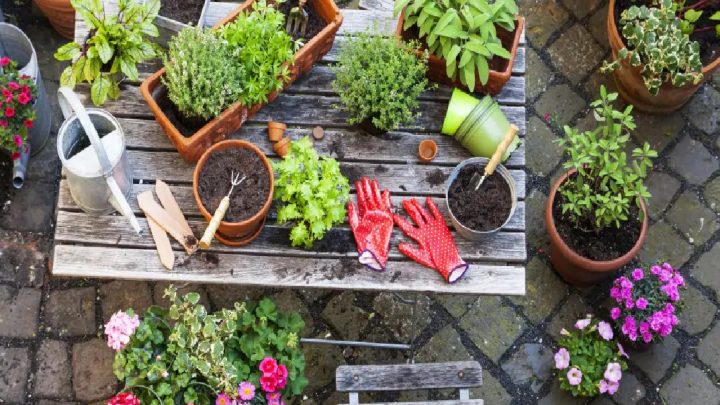There are many positive impacts to gardening, not only from a nutritional perspective, but from a physical and psychological wellness perspective as well. Have you always wanted to test out your green thumb, but are unsure where to start? Now is a great time to start a garden of your own – from seed! Only have a small porch or a windowsill? Worry not, Healthy Workplace has you covered.
Good for the ‘Soil’
There are many benefits from growing your own vegetables or flowers:
- It is mentally stimulating and has been proven to lower stress levels.
- Through exposure to more bacteria in the dirt, it becomes harder for said bacteria to cause illness in the future
- If you have high crop yields, it saves you money from buying organic at the grocery store.
- Spending time in the garden is a form of exercise and is great for heart, lung and joint health
The Need for ‘Seed’
Many of us can start a garden from what we have at home. However, to get yourself started, you will first need soil and seeds. Most if not all garden or nurseries provide curbside pickup for these items so not only can you get started on your own garden but you can help small businesses during this time.
Some local garden centers are listed below that have social distancing pick-up plans in place.
- Ancaster – Harper’s Garden Centre (https://harpersgardencentre.com)
- Brantford – Walter’s Greenhouse (https://www.waltersgreenhouse.ca/)
- Dundas – Holland Park Station Home (https://www.hollandparkdundas.ca/)
- Georgetown – DG Greenhouse (https://shops.dggreenhouses.com/)
- Milton – Jade Gardens (https://www.jadegardens.com/)
- Waterdown – Terra Greenhouses (https://www.terragreenhouses.com/)
Started from the Ground Now We’re Here
If you do not have large pots, or a backyard to start a garden, there are many alternatives you can use from around the house. Many household items can be used to start your seedlings in:
- Cups, mugs, reusable water bottles
- Tim Horton’s or fast food cups (washed)
- K-cups, toilet paper rolls, egg cartons
- Tupperware, ice cube trays, muffin liners in muffin tins
- DIY newspaper seed cups.
Plant the seeds according to the packet instructions and watch your garden grow!
‘Contain’ your Excitement
While not all of us have backyards, sunny windowsills/rooms and balconies provide enough room for you to grow many container plants.
- Tomatoes, peppers, broccoli, cauliflower, spinach, lettuce and carrots all do well in containers. The restricted space keeps the plants from becoming unmanageable.
- Herbs do well in small containers on a windowsill
- Small vegetables such as onions, garlic, scallions, micro greens and sprouts do well indoors in small pots.
Herb your Enthusiasm
Herbs are a great addition to a balcony or indoor garden. They’re easy to care for, quick to grow and can also last years with proper care. You can also cut off new growth to use as ingredients for cooking. This, while saving you a trip to the grocery store will also encourage new growth. Sage, Thyme, Chives and Mint are some examples of herbs which will provide you ingredients year round
We’re ‘Rooting’ For You!
Below are some tips when growing your own garden from seed:
- Cover your seeds with plastic (cling wrap works) until you see sprouts then remove the plastic and place in a sunny location (example windowsill or room with ample lighting)
- If you see long stems with leaves on top, this means your plants are not getting enough light and need to be moved to another location.
- Keep your growing medium moist but not wet. If you see mold start to form, lightly scrap it off (a q-tip will suffice) and wait until the soil dries out before next watering.
- To encourage strong stems, have a fan blowing on your seedlings for a few hours a day. This helps to ensure strong stalks and makes the transition to the outdoors less shocking.
- Move seeds outside first on a sunny warm day for a few hours. Do not put in direct sunlight. Every day, leave them outside for slightly longer until they’re ready to plant in the ground.

